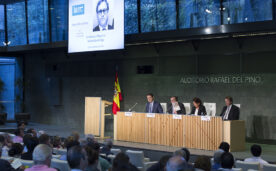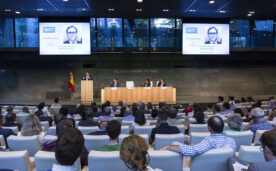The fourth revolution. The global race to reinvent the state
Summary:
In recent times, a trend towards political extremism, towards populism, has been observed in more and more countries. The victory of Syriza in the Greek elections, the leadership of Donald Trump in the race for the Republican nomination for the US presidential elections, or the triumph of the radical Jeremy Corbyn in the vote to elect the leader of the British Labour Party, are all examples of this movement. A trend that, according to Adrian Wooldridge, is explained by the fact that voters are "furious" with the political class. For Wooldridge, editor of the weekly magazine The Economist, in which he writes the Schumpeter column, the root of the problem lies in a mistake by the political elites because, among them, no one thinks about the failures of government, or how to improve it. This fact gives rise to the idea that nothing can be done to fix the state, which gives rise to a growing feeling among citizens of disaffection with traditional political institutions. However, in his opinion, this attitude is mistaken because the problem has a solution. The solution lies in the reinvention of the state, a process Wooldridge calls the fourth revolution. History shows that since the modern state was created in Europe, it has been constantly reinventing itself. In fact, the process of invention and reinvention of the state has known "three and a half revolutions", according to Wooldridge. The first of these, in the 17th century, was a revolution that sought to bring physical security to countries in an environment of constant warfare. The solution was the emergence of centralised states. The philosopher Thomas Hobbes saw it as the only answer to the wickedness, brutality and brevity of human life and named it after a biblical monster: Leviathan. The invention was a success because competition between European states gave birth to an ever-improving system of government. It was this competition that caused the West to leave the other regions of the world behind and made Europe the true centre of power. The second revolution took place in the late 18th and early 19th centuries and was inspired by the desire for freedom. Although some people identify this change with the American Revolution, or the French Revolution, the real revolution took place in Britain in the Victorian era. Its aim was to promote individual liberty, for which it was necessary to introduce state responsibility and to limit the state's ability to affect that liberty. The British "copied" from the Chinese the idea of a professional and efficient civil service, replacing the system of rent distribution to the aristocracy that had characterised it until then. The philosopher John Stuart Mill, moreover, advocated the idea of the need to reduce the presence of the state and its size and limit its role to better provision of services to the people. The inspiration for the third revolution was compassion. British liberals thought that it was necessary to invest in the quality of the population, in their welfare, and so it was necessary to provide citizens with services such as education, health and pensions. Thus the welfare state was born. This model, which originated in Great Britain, gradually spread to other Western countries. At the same time, the state began to grow larger and larger due to the increasing demands of citizens for public services and the rising expectations of politicians with their promises. The model worked well for a while, but then led to inflation and economic stagnation. The half revolution was the attempt by Ronald Reagan and Margaret Thatcher in the 1980s to reduce the size of the state, but it was only half a revolution because they only succeeded while they were in power. Then came the Bushes, Blair or Brown and with them public spending grew again. And not only that; there was also, in parallel, an increase in regulation, i.e. state intervention in economic life. This process leads us to the need for a fourth revolution, due to two types of causes. On the one hand, there are the negative reasons. The first of these is very high public spending, which causes people to become "addicted" to it and leads to permanent budget deficits. The second is adverse demographics, in the form of an ageing population, which decreases the number of working people and increases both the number of retired people and the related public expenditure. From this perspective, the current state model is unsustainable. But there are also two positive reasons to justify this fourth revolution. First, there is the technological revolution and its consequences for the capacity to change what the state does. The application of new technologies means a revolution in public services, increasing efficiency in their provision, for example in health or education. The second is the growing competition from emerging economies, which is also being seen in the area of model states. In Asia, new forms of state are being invented to provide public services. This leads to the emergence of new competitors, but with a different value system in which democracy and freedom have little or no weight. These elements explain the need for a fourth revolution, to reform the state in order to save it. This requires the political class to stop making promises and generating expectations that are difficult to fulfil in relation to the state, because it is these unfulfilled promises and unfulfilled expectations that give rise to public support for populist options. The state needs to reinvent itself to meet the challenges posed by the growing weight of public spending, an ageing population, technological development and the emergence of new competitors with value systems different from those of the Western world. This process of reinvention is what Adrian Wooldridge, editor of The Economist, calls the "fourth revolution" of the state. The fourth because it follows three previous ones: the one that saw the birth of centralised states, the one that transformed them to promote individual liberty, and the one that created the welfare state. This document summarises what was discussed during the meeting held for this purpose at the Foundation. The Rafael del Pino Foundation is not responsible for the comments, opinions or statements made by the people who participate in its activities and which are expressed as a result of their inalienable right to freedom of expression and under their own responsibility.
The Rafael del Pino Foundation is not responsible for the comments, opinions or statements made by the people who participate in its activities and which are expressed as a result of their inalienable right to freedom of expression and under their sole responsibility. The contents included in the summary of this conference are the result of the debates held at the meeting held for this purpose at the Foundation and are the responsibility of their authors.
The Rafael del Pino Foundation is not responsible for any comments, opinions or statements made by third parties. In this respect, the FRP is not obliged to monitor the views expressed by such third parties who participate in its activities and which are expressed as a result of their inalienable right to freedom of expression and under their own responsibility. The contents included in the summary of this conference are the result of the discussions that took place during the conference organised for this purpose at the Foundation and are the sole responsibility of its authors.






